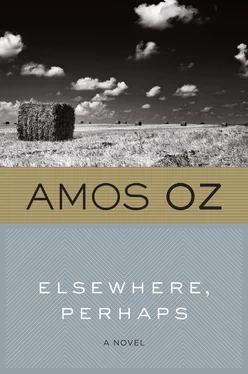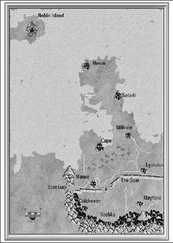It was the first of May when the rain fell.
As usual on May Day, we had put up the flags of Israel and the party round the big lawn, erected a small platform and laid out a lot of wooden benches facing it. The benches were thronged with our members and young people. The platform was decorated with red and white bunting, with a slogan in the middle, "Workers of the World Unite," written in red on green and framed with cypress boughs. There was a table of cold drinks on the edge of the lawn. Izia Gurevitch-Gilead had been sent from the central committee to deliver the party message. He stood up on the platform and spoke briefly. A light breeze ruffled his graying hair and also made the flags dance.
There were dark clouds in the west. As twilight approached, the clouds took on colors of startling brightness. The sun has a habit of setting the clouds on fire before retiring for the night.
Anyone with a feeling for the weather could tell in advance that rain was imminent. The previous week we had suffered from a heat wave. But the beginning of the week had brought a change. A discerning eye could see the signs. A nervous tension filled the air, and ominous signs began to appear on the western horizon. On Monday evening the setting sun was soaked up by a bank of cloud. The sunset was purple. Even the temperature dropped somewhat. On Tuesday morning the color of the sky changed, if only slightly. The pale, whitish blue gave way to a deep rich blue, as if the sea had risen to hang upside down in the air over our tiny roof tops and far beyond to the peaks of the distant mountains.
On Wednesday the air became heavier, and the dusty cypresses seemed even more tense than usual. And on Wednesday night, an hour before midnight, the wind arrived. As yet, a soft, tentative breeze, whispering secretively to the trees shading the paths of the kibbutz.
Some said:
"It'll rain by the end of the week."
Others said:
"It's the wrong time of year for rain. It hardly ever rains so late in the season."
But some said:
"It may be the last rain of spring."
At daybreak on Thursday the sea turned stormy. Ripples and waves appeared faraway to the northwest. All day long ragged clouds scudded eastward.
On Thursday night lightning flashed in the north, without a sound of thunder. There was activity in the sheds and barns and storehouses: even the more practical men had begun to smell rain and got busy moving sacks, machines, and agricultural tackle under shelter.
Finally, on Friday, which was May Day, the wind pretended to make peace with us. Insidiously, that morning, it played the part of an ordinary spring breeze.
The celebrations were opened at five o'clock in the afternoon by Mundek Zohar, who spoke of Labor Day as a symbol of the fellowship of workers all over the world. He himself was standing in, he said, for our comrade Reuven Harish, who had been taken ill with a slight cold, and he was sure we all wished him a speedy and complete recovery.
Next, a diminutive girl in a blue skirt and white blouse read out from the newspaper the message from the Secretary-General of the labor movement. The assembled company sang the party anthem and one or two more favorite songs of the movement. Then Mundek stood up again and announced that Izia Gurevitch-Gilead, a veteran worker for the party and the movement, whose devotion to the cause in the early days we all still remembered with pride and gratitude, would now convey to the gathering a message from the movement.
Izia Gurevitch-Gilead began by saying that we were going through a difficult time. He explained briefly why we were going through a difficult time. He went on to talk about the relevance of Labor Day at this moment in time. There was a noisy disturbance, as a tractor made its way round the edge of the gathering, taking a cartload of sacks from one place to another.
The disturbance was short-lived. The tractor passed on, and we sat back once again to drink in the speaker's words.
"Great changes have taken place in the world," Izia Gure-vitch-Gilead said, "since the Internationale was composed. Nevertheless…"
The twilight deepened. A dark veil intervened between the sun and the earth. Hasia Ramigolski said:
"It's turned cold all of a sudden."
Young Ido Zohar, who was sitting next to her, thought aloud:
"It'll start raining before he's stopped speaking."
Hasia said:
"Don't exaggerate."
And Izia Gurevitch-Gilead:
"It is very easy to have faith in times of faith. True faith, comrades, emerges in times of doubt, like today. Everyone imagines now that organized society has solved all its problems and that any outstanding problems can be overcome in a moment. They don't seem to realize that the greatest problems of all, the problems of survival, remain to be grappled with. What we need is faith."
***
Ido steals a glance at the woman sitting next to him. Hasia's body is plump, her legs stout and covered with fine down. Her gray skirt has slipped up. Slowly, stealthily the boy moves his thigh closer to Hasia's. His imagination runs riot. Stricken with alarm and remorse, he withdraws his leg, striving to avoid the slightest contact with his neighbor. But his fingers are shaking. He looks away, fixing his gaze on one of the flags flapping in the breeze. It won't calm down.
There is no doubt now that it is dark. Izia Gurevitch-Gilead is almost invisible. Only his outline shows on the platform. A brisk gust of wind makes the skin stiffen. Tears of shame well up in Ido's eyes. He breaks his mental vow and squints again at the uncovered knees. They are white, he sees, and gently curved like the rows of vines when they reach the lower slopes.
Izia Gurevitch-Gilead lowers his voice and stresses one word after another:
"The prophets of Israel were the first men to give the world the concept of social justice."
He is hemmed in now by electric lights. His silvery hair shines like an ancient warrior's helmet. A night bird suddenly screeches nearby, and the orator starts, because it sounds just like a woman screaming.
Hasia leans toward Ido and says anxiously:
"Aren't you cold?"
And answers her own question:
"Of course you're cold in a thin shirt like that. Would you like to put my sweater on? I'm wearing a flannel shirt underneath. I won't be cold. Well? Don't be shy."
And Ido:
"You… you don't need to give me anything."
He chews his lower lip, and adds:
"Actually, I…"
"Yes, you'd like the sweater after all? Take it, take it; you're shivering with cold."
"No, no, thank you, I don't need it."
"But you just said…"
"Me? I didn't say anything. It's the other way round. I thought you said something. I didn't."
And the speaker:
"The concept of social justice does not recognize national boundaries. On the contrary. Its aim is to eradicate false frontiers and to set up true frontiers…."
At this point the clouds burst. The rain did not start gradually; it came like a sudden blow. The thunder pounded us like a fist in a woolen glove. The first drops, unnaturally warm and thick, splashed on the dusty ground. The dust at first proudly resisted the inevitable and swallowed the water. But as the ferocious torrents continued to pour down, the dust surrendered and fled in confusion and panic into the depths of the drains. The trees were caught in a damp vapor, which closed round the lamps and played strange games with their light. A metal gutter chanted a melancholy tune.
The crowd, naturally enough, fled in disorder for shelter. In the confusion, without any prior intention, two bodies touched. With burning cheeks the boy ran after the woman, calling out:
"I'm sorry, Hasia, it was an accident."
The woman, who had felt nothing and was surprised at the cry, shouted as she ran:
Читать дальше












